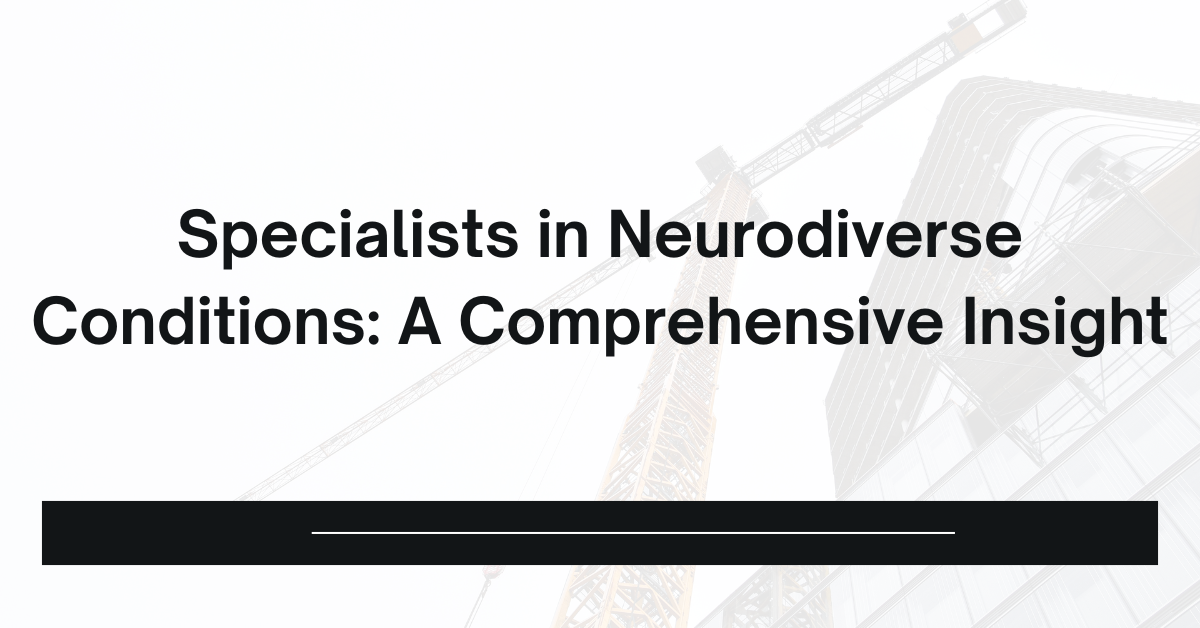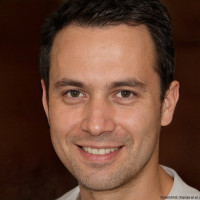Specialists in Neurodiverse Conditions: A Comprehensive Insight

Strong 8k brings an ultra-HD IPTV experience to your living room and your pocket.
Specialists in neurodiverse conditions help individuals thrive through personalized support. Neurodiversity is a term that is gaining increasing attention and importance in both healthcare and society at large. It refers to the natural variations in the human brain and cognition, such as those seen in conditions like autism, ADHD, dyslexia, dyspraxia, Tourette’s syndrome, and others. These differences are not deficits but part of the broad spectrum of human diversity. Specialists in neurodiverse conditions play a vital role in supporting individuals, families, and communities to better understand, embrace, and navigate these differences.
Understanding Neurodiversity and Its Impact
The concept of neurodiversity challenges traditional medical models that treat conditions like autism or ADHD solely as disorders to be "fixed" or "treated." Instead, it encourages an approach that recognizes the strengths and unique perspectives neurodivergent individuals bring. However, many neurodiverse people still face challenges related to social integration, education, employment, and healthcare access. This is where specialists in neurodiverse conditions become crucial.
Specialists in this field are trained to assess, diagnose, and support individuals across the neurodivergent spectrum. Their expertise covers a wide range of areas, from cognitive behavioral strategies and therapy to education support and workplace accommodations. Whether working in schools, clinics, or private practices, their role is to help neurodivergent individuals lead fulfilling lives by focusing on ability rather than limitation.
The Importance of Early Identification
One of the most critical roles specialists play is in the early identification and diagnosis of neurodiverse conditions. Early detection allows for timely intervention, which can significantly improve developmental outcomes and quality of life. A child with autism, for example, may benefit greatly from early behavioral therapies, speech support, and structured learning environments. Specialists use a variety of tools and assessments to observe behaviors, communicate with caregivers, and identify symptoms that might otherwise go unnoticed.
However, diagnosis is only one part of the equation. Specialists also ensure that the diagnostic process is compassionate and empowering. They help individuals and families understand that a diagnosis is not a label to be feared but a gateway to appropriate support and self-awareness. This shift in perspective helps reduce the stigma often associated with neurodiverse conditions.
Providing Tailored Interventions
Every neurodiverse individual is unique, and a one-size-fits-all approach rarely works. Specialists develop personalized intervention strategies based on the specific needs, goals, and circumstances of each person. For instance, an adult with ADHD may require coaching to improve organizational skills and manage time effectively, while a teenager with dyslexia may benefit from assistive technology and tailored reading instruction.
Therapies and interventions might include cognitive behavioral therapy, social skills training, occupational therapy, speech and language therapy, or sensory integration strategies. These are often delivered in collaboration with families, educators, and other healthcare professionals. This multidisciplinary approach ensures that the interventions are holistic and address the individual's needs across different aspects of life.
Supporting Education and Learning Environments
Educational settings can be challenging for neurodiverse students, particularly when systems are not designed to accommodate different learning styles. Specialists in neurodiverse conditions often work directly with schools and educators to create more inclusive learning environments. This may involve recommending accommodations, modifying classroom environments, training staff, or implementing individualized education plans (IEPs).
By helping educators recognize and respond to neurodiverse needs, specialists contribute to a culture where every student has the opportunity to thrive. They advocate for universal design in learning, which supports all learners, not just those with specific diagnoses. Through their guidance, schools can move away from rigid teaching methods and embrace a more flexible, student-centered approach.
Addressing Mental Health and Emotional Wellbeing
Neurodiverse individuals are more likely to experience co-occurring mental health conditions such as anxiety, depression, and low self-esteem. This often stems from misunderstanding, social isolation, bullying, or the pressure to conform to neurotypical standards. Specialists are trained to recognize these emotional struggles and provide targeted mental health support.
Therapists and counselors working in this space offer a safe and affirming environment where neurodivergent individuals can explore their thoughts and feelings without judgment. Techniques such as mindfulness, narrative therapy, and acceptance and commitment therapy are often used to enhance emotional resilience and promote self-acceptance. The goal is not to change the individual but to support their mental and emotional health in a way that aligns with their identity.
Advocating for Inclusion in the Workplace
Workplace inclusion is a growing area of focus for specialists in neurodiverse conditions. Many adults with conditions like autism, ADHD, or dyslexia face significant barriers to employment, not because they lack skills, but because workplaces are not always accommodating of their differences. Specialists work with employers to foster inclusive hiring practices, develop supportive work environments, and provide training on neurodiversity awareness.
They also support neurodivergent individuals in navigating career development, from understanding their strengths and workplace rights to building confidence in job interviews and daily responsibilities. Some specialists offer ongoing coaching and mentorship, helping clients not only find jobs but also thrive in them. The goal is to promote a workplace culture where diverse thinking styles are celebrated rather than marginalized.
The Role of Families and Communities
Family and community support are essential in the journey of any neurodiverse individual. Specialists often engage in family counseling, education sessions, and community outreach programs to create a strong support system around the individual. They help families understand how best to support their loved one while also addressing their own emotional needs and challenges.
Through community workshops, support groups, and public awareness campaigns, specialists also work to reduce stigma and foster greater acceptance. As society becomes more informed about neurodiversity, communities can begin to shift from a deficit-focused mindset to one of inclusion and celebration of differences.
The Future of Neurodiverse Support
The field of neurodiversity is evolving rapidly, with growing research, better diagnostic tools, and more emphasis on strengths-based approaches. Specialists continue to advocate for systemic change in education, healthcare, and employment, pushing for reforms that reflect the realities and needs of neurodiverse individuals.
Technology is also playing a transformative role, from AI-powered diagnostic tools to virtual therapy platforms and assistive learning apps. However, the human connection remains at the heart of this work. Specialists must continue to listen, learn, and adapt to provide the most compassionate and effective support possible.
Frequently Asked Questions (FAQs)
What does it mean to be neurodivergent?
Being neurodivergent means having a brain that functions differently from what is considered "typical." This can include conditions like autism, ADHD, dyslexia, dyspraxia, and more. It is not a disorder or defect but a variation of human cognition.
How can a specialist help someone who is neurodivergent?
A specialist can provide assessment, diagnosis, personalized interventions, therapy, educational support, and workplace guidance. They help individuals understand their strengths and challenges while promoting inclusion in all areas of life.
When should someone see a neurodiversity specialist?
If an individual shows signs of difficulties in communication, learning, social interaction, attention, or sensory processing, it might be beneficial to consult a specialist. Early intervention often leads to better outcomes.
Are neurodiverse conditions curable?
Neurodiverse conditions are not diseases and therefore not something to be "cured." The goal is not to change the individual but to support them in managing challenges and harnessing their unique strengths.
Do specialists work only with children?
No. Specialists work with individuals of all ages—from young children to adults. Neurodiversity affects people throughout their lives, and support needs can change over time.
How are neurodiverse conditions diagnosed?
Diagnosis typically involves interviews, behavioral observations, standardized assessments, and input from multiple sources such as teachers and family members. It is a comprehensive and individualized process.
What kind of professionals are considered specialists in neurodiverse conditions?
These specialists can include clinical psychologists, educational psychologists, occupational therapists, speech and language therapists, neurodevelopmental pediatricians, and specialized counselors.
Is there a difference between being diagnosed and being identified as neurodivergent?
Yes. A formal diagnosis is usually given by a healthcare professional after thorough assessment. Being identified as neurodivergent might also come through self-awareness or informal evaluation, especially in adults who may not have been diagnosed in childhood.
Can someone be both gifted and neurodivergent?
Absolutely. This is known as "twice-exceptional" or 2e. Individuals may show high intelligence or talent in certain areas while also facing challenges associated with a neurodiverse condition.
Where can I find a specialist in neurodiverse conditions?
You can start by asking your GP, school SEN coordinator, or mental health provider. There are also specialized clinics and professional directories online that list neurodiversity-informed professionals.
If you're navigating life with a neurodiverse mind—or supporting someone who is—know that help is available. With the guidance of compassionate specialists, neurodiversity can be a source of strength, identity, and empowerment. Society is slowly shifting toward greater awareness, but the journey begins with understanding—and specialists are leading the way.
Note: IndiBlogHub features both user-submitted and editorial content. We do not verify third-party contributions. Read our Disclaimer and Privacy Policyfor details.





